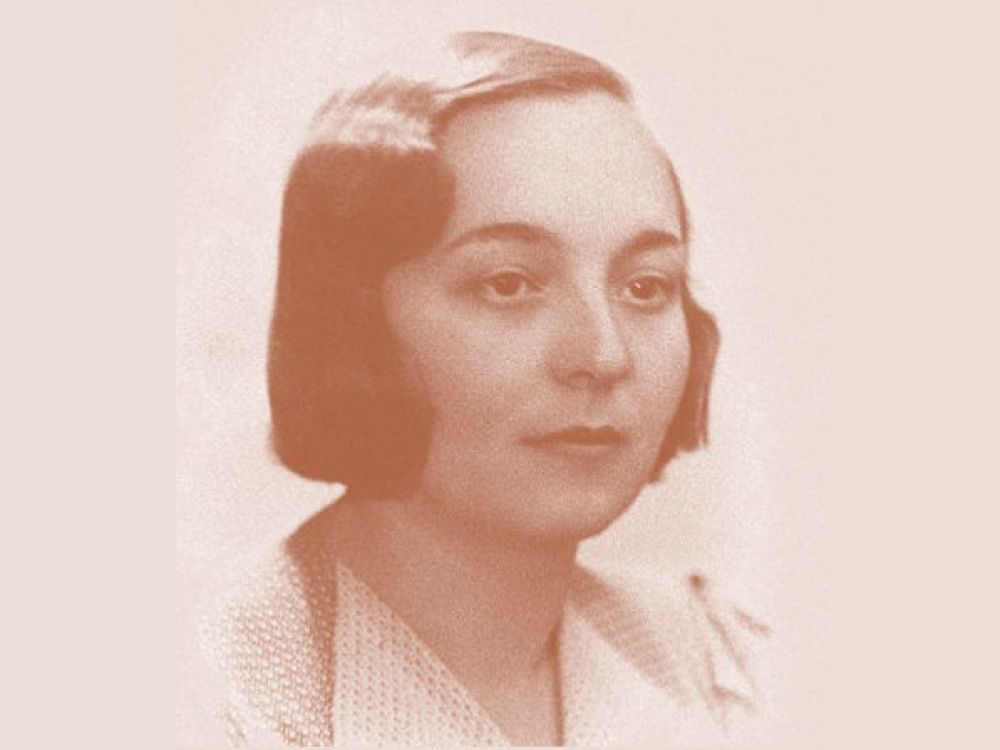Henryka Łazowertówna


Henryka Łazowertówna
Henryka Wanda Łazowertówna was born in Warsaw on June 19, 1909 in the family of Maksymilian and Bluma. She graduated from the Narcyza Żmichowska high school and studied Polish and Romance philology at the University of Warsaw. [1] In 1930, she published her first volume of poetry Zamknięty pokój [Closed Room], and in 1934, the second – Imiona świata [Names of the World]. Unlike many authors of Jewish origin, she wrote only in Polish.
She collaborated with the literary magazines ”Droga” [The Way] and ”Plon” [The Harvest] as well as the Association of Polish Writers. Emanuel Ringelblum emphasizes that, despite her Jewish origin, she received state scholarships which allowed her to go to study in Grenoble. She lived with her mother at Sienna Street, collecting books was her passion.
![imiona_swiata_1.jpg [285.37 KB]](https://www.jhi.pl/storage/image/core_files/2022/3/14/fd2f95cc7acaae40af06048ad36d9d99/jpg/jhi/preview/imiona_swiata_1.jpg)
When I was sixteen
I thought that the world is large,
but you can take it and double with words,
rhyme with man, capture in a poem,
like a nightingale – and a wave – and the moon.
And then like a tree, rustling, it grew
and took its roots in me:
every morning called me like a long voyage,
in every day weaved a tear – or a smile.
(...)
(translated by Przemysław Batorski)
After the outbreak of the war and the creation of the ghetto, her apartment was located in the so-called the small ghetto, where most of the Jewish elite lived and the living conditions were better. „The material situation of the writers was dramatic,” emphasize Jacek Leociak and Barbara Engelking. – „Deprived of livelihoods, they looked for any activities.” [2] Łazowertówna started working for CENTOS (a Jewish organization that looked after children, especially orphans) and for the Jewish Social Self-Help.
“Her propaganda materials, posters, appeals, letters, etc. were warm, light and simple in style. (…) The poet wrote them with the blood from under her aching heart, so sensitive to the terrible suffering of the Jewish masses of the people,” [3] wrote Emanuel Ringelblum, who invited her to the Oneg Shabbat group. There she wrote mainly accounts of people who had to leave their destroyed homes or were displaced by the Germans. As Ringelblum added, „it revealed to the social activists in Warsaw the terrible tragedy of each one of the hundred thousand refugees”. [4]
In a secret competition organized by the creators of the Archive in order to collect new materials among the Jewish intelligentsia, Łazowertówna won the first prize with a text describing the struggle of a Jewish family of refugees from Bydgoszcz for survival in the ghetto. [5] Unfortunately, this work was not found after the war. [6] According to Ringelblum, „she presented a well-situated Jewish family from Bydgoszcz, which, after being resettled to Warsaw, was going down one step by one. In the end – after selling out everything – they quietly, slowly starved to death. The poet became interested in the fate of a thin, little boy who remained alone of the whole family and, thanks to social help, was saved from death.” [7]
![dziecko_mur_getta_zih.jpg [706.48 KB]](https://www.jhi.pl/storage/image/core_files/2022/3/14/6a6a24733c97f2dd57bb65b00a526d17/jpg/jhi/preview/dziecko_mur_getta_zih.jpg)
In the ghetto, Henryka Łazowertówna still participated in poetry evenings and wrote poems. The most famous of them is The Little Smuggler. Ringelblum wrote that she recited it in August 1941 [8] and that it was „a poet’s celebration of thousands of four and five-year-old smugglers (…). The poem about the little smuggler, recited at academies and literary evenings, made a great impression on everyone”. [9] A song was written to the poem’s words, and later became popular in the streets of the ghetto.
“Łazowertówna suffered from lung disease, but without more cash, without some ten thousand zlotys, it was impossible to dream about the Aryan side,” noted Ringelblum. – “She had many Polish friends (…) yet there was no one who would save her.” [10]
She went to the train to Treblinka “voluntarily with her mother. At the Umschlagplatz, efforts were made to prevent her from going to the wagon, but no one wanted or could release her mother. Henryka Łazowertówna knew very well that deportation meant death, but she followed her mother”. [11]
Among the outstanding people known and close to me, the following died: Rabbi Huberband, Mrs. Słapak with her daughter, Celina Lewin with her son, the poet Łazowert[ówna], Winnik. [12]
– wrote Abraham Lewin in his diary on August 29, 1942.
The Little Smuggler
Past rubble, fence, barbed wire
Past soldiers guarding the Wall,
Starving but still defiant,
I softly steal past them all.
At noon, at night, in dawning hours,
In blizzards, in the heat,
A hundred times I risk my life,
I risk my childish neck.
Clutching a bag of sacking,
With only rags to wear,
With limbs numbed by winter,
And hearts numbed by despair,
Yet everything must be suffered;
And all must be endured,
So that tomorrow you can all
Eat your fill of bread.
Through walls, though holes, through brickwork,
At night, at dawn, at day,
Hungry, daring, cunning,
Quiet as a shadow I move.
And if the hand of sudden fate
Seizes me at some point in this game,
It’s only the common snare of life.
Mama, don’t wait for me.
I won’t return to you,
Your far-off voice won’t reach.
The dust of the street will bury
The lost youngster’s fate.
And only one grim thought,
A grimace on your lips:
Who, my dear Mama, who
Will bring you bread tomorrow?[13]